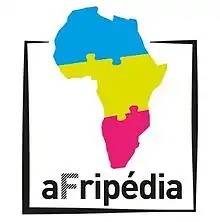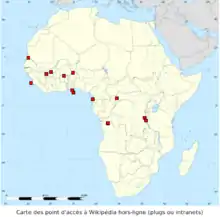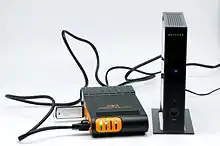Afripedia Project
The Afripedia Project was launched in mid-June 2012 and is ongoing. It aims to expand offline Wikipedia access in French-speaking Africa, and encourage Africans to contribute to Wikipedia.[1] The project installs local Kiwix-serve wireless and intranet servers and provides training and maintenance support.[2]
 Afripedia Logo |


The founding partners are Wikimédia France, the Institut Français, and the Agence universitaire de la Francophonie.[3] French is spoken by an estimated 120 million (2010) people in Africa, spread across 24 francophone countries.[4]
Access to Wikipedia from USB keys was not new in Africa, but keys are often very outdated,[1] where Afripedia is regularly updated.[5] Many of the partnering universities have low-bandwidth internet, but a few have no internet access.[2]
The project offers additional content besides Wikipedia, such as Wiktionary.[5] Any content that is first packaged in a ZIM file can be relayed over the Afripedia network;[6] Project Gutenberg and Wikisource, for instance, are available as ZIM files.[7][8]
The project also encourages the formation of Afripedia clubs for local users.[9]
The project has been described as a worthy stopgap measure, until such time as internet access can be developed throughout Africa.[3]
Timeline
- Autumn 2011 – Spring 2012 : Project preparation, partnership formation, Kiwix algorithm development
- 2012, June 15 : Agreement signed on behalf of the Agence universitaire de la Francophonie, the Institut français, and Wikimédia France, by Bernard Cerquiglini (AUF), Xavier Darcos (IF) and Rémi Mathis (WMFr).
- July 2012 : Presentation of project and prototype at the Forum mondial de la langue française in Québec
- 2012, November 6–9 : training of 15 leaders from 12 East and Central African countries held at the Campus numérique francophone at the Université Félix Houphouët-Boigny in Abidjan, Ivory Coast; deployment of 15 offline access points (plug computer + USB key+ wifi router)
- 2013, June 24–28 : Second training and deployment, in Kinshasa
- 2013, October 14–18 : Third training and deployment, in Yaoundé
- 2014, September 29 – October 3: Fourth, Antananarivo
See also
- For more details see the Afripedia project website (in French Wikipedia).
- Internet-in-a-box
| Wikimedia Commons has media related to Afripedia. |
References
- Afripedia, Wikipédia pour l'Afrique, news interview article in Citazine
- Afripedia project increasing off-line access to Wikipedia in Africa, Wikimedia article
- Afripedia ou comment consulter Wikipedia sans Internet, article in Slate Afrique
- (in French) La Francophonie dans le monde 2006–2007 published by the Organisation internationale de la Francophonie. Nathan, Paris, 2007
- Afripédia : un projet de promotion de Wikipédia en Afrique, news article in Afrik
- Kiwix list of available content
- Emmanuel Engelhart: 50.000 public domain books available to everybody, everywhere, offline. In: Wikisource-l-Mailinglist. 19. November 2014. Accessed on 26 November 2014.
- #Wikimedia & Project #Gutenberg – the sum of all knowledge on Words and what not blog
- Afripedia project website
.jpg.webp)